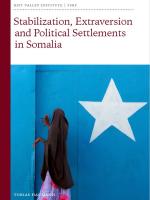Why statebuilding in Somalia continues to fail
Why is Somalia still far from achieving a lasting political settlement, after decades of international military, diplomatic and aid interventions to stabilize the war-torn country? This study by DIIS visiting scholar Tobias Hagmann argues that international aid and the interplay between local and foreign elites in policies and practices has frequently undermined state-building efforts in south-central Somalia.
Internationalised state-building has encouraged Somalis to privilege the creation of formal state institutions - such as the current Somali Federal Government - over the actual work of state formation that would include effective security provision, taxation and popular representation. Externally sponsored stabilisation and statebuilding have repeatedly undermined key objectives of state reconstruction in Somalia. Rather than assuming that foreign actors are external to the evolving conflict dynamics of warlord economies, militant Islamism or political settlements, this thought-provoking report concludes that they should instead be understood as integral to them. Consequently, the power and interests of both Somali and international actors must be considered in order to understand the shortcomings of stabilization policies.

